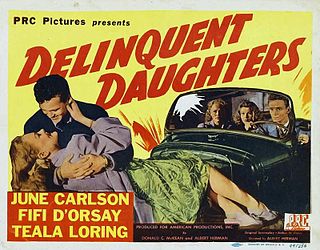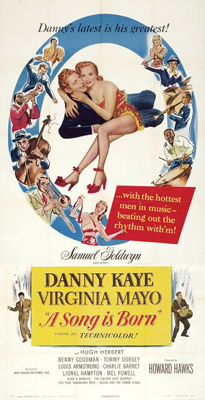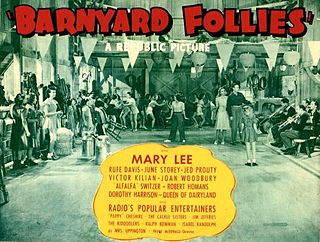
A Letter to Three Wives is a 1949 American romantic drama that tells the story of a woman who sends a letter to three women, saying she has left town with one of their husbands without revealing which one. It stars Jeanne Crain, Linda Darnell, Ann Sothern, Paul Douglas, Kirk Douglas, and Jeffrey Lynn. Thelma Ritter as "Sadie" and Celeste Holm have key supporting roles.

I'll Cry Tomorrow (1955) is a biopic that tells the story of Lillian Roth, a Broadway star who rebels against the pressure of her domineering mother and struggles with alcoholism after the death of her fiancé. It stars Susan Hayward, Richard Conte, Eddie Albert, Margo, and Jo Van Fleet.

High Plains Drifter is a 1973 American Western film directed by Clint Eastwood, written by Ernest Tidyman, and produced by Robert Daley for The Malpaso Company and Universal Pictures. The film stars Eastwood as a mysterious stranger who metes out justice in a corrupt frontier mining town. The film was influenced by the work of Eastwood's two major collaborators, film directors Sergio Leone and Don Siegel. In addition to Eastwood, the film also co-stars Verna Bloom, Mariana Hill, Mitchell Ryan, Jack Ging, and Stefan Gierasch.

Convention City is a 1933 American pre-Code sex comedy film directed by Archie Mayo, and starring Joan Blondell, Guy Kibbee, Dick Powell, Mary Astor and Adolphe Menjou. The film was produced by Henry Blanke and First National Pictures and distributed by Warner Bros.

Hobart Cavanaugh was an American character actor in films and on stage.

Delinquent Daughters, or Accent on Crime, is a 1944 American drama film directed by Albert Herman and starring June Carlson, Fifi D'Orsay and Margia Dean. An exploitation film, it is about a police investigation into the suicide death of a high school girl and the hard-partying teenagers at a party prior to the incident.

A Song Is Born, starring Danny Kaye and Virginia Mayo, is a 1948 Technicolor musical film remake of Howard Hawks' 1941 movie Ball of Fire with Gary Cooper and Barbara Stanwyck. This version was also directed by Hawks, based on the story "From A to Z" by Billy Wilder and Thomas Monroe, adapted by Harry Tugend (uncredited) and produced by Samuel Goldwyn and released by RKO Radio Pictures.

Ladies in Retirement is a 1941 American film noir directed by Charles Vidor and starring Ida Lupino, Louis Hayward and Evelyn Keyes. It was produced and distributed by Columbia Pictures. Lupino and Hayward were married at the time. It is based on a 1940 Broadway play of the same title by Reginald Denham and Edward Percy that starred Flora Robson in the lead role.

This Modern Age is a 1931 American pre-Code Metro-Goldwyn-Mayer feature film directed by Nick Grinde and starring Joan Crawford, Neil Hamilton, Pauline Frederick and Albert Conti.

Nothing but the Truth is a 1941 American comedy film directed by Elliott Nugent and starring Bob Hope, Paulette Goddard and Edward Arnold. It was produced and distributed by Paramount Pictures. It was Hope and Goddard's third movie together in three years..

The Wagons Roll at Night is a 1941 American circus drama film directed by Ray Enright and starring Humphrey Bogart as traveling carnival owner Nick Coster, Sylvia Sidney as his girlfriend, and Eddie Albert as a newcomer who falls in love with Nick's sister, played by Joan Leslie. The screenplay is by Fred Niblo Jr. and Barry Trivers, and the film is based on the 1936 novel Kid Galahad by Francis Wallace, first published as a serial in The Saturday Evening Post.

Brenda Starr, Reporter (1945) was the 25th film serial released by Columbia Pictures. It was inspired by Brenda Starr, Reporter, a popular comic strip created by Dale Messick. The title role was played by Joan Woodbury, who had similar roles in feature films for Columbia and Monogram.

Joan Elmer Woodbury was an American actress beginning in the 1930s and continuing well into the 1960s.

Three Girls About Town is a 1941 American comedy film directed by Leigh Jason and starring Joan Blondell, Binnie Barnes and Janet Blair. It was produced and distributed by Columbia Pictures. The story was written by Richard Carroll.

Now I'll Tell is a 1934 American Pre-Code drama film directed by Edwin J. Burke starring Spencer Tracy, Helen Twelvetrees, and Alice Faye. It was produced by Fox Film shortly before the company's merger with Twentieth Century Pictures. It marked the final screen appearance of former silent star Alice Calhoun.

I Killed That Man is a 1941 American mystery film directed by Phil Rosen and starring Ricardo Cortez, Joan Woodbury and Iris Adrian. Produced by the King Brothers for release by Monogram Pictures, it is a remake of the 1933 film The Devil's Mate which Rosen had also directed.

Lydia Bailey is a 1952 American historical adventure film directed by Jean Negulesco and starring Dale Robertson, Anne Francis and Charles Korvin. It was made by 20th Century Fox and based on the 1947 novel of the same name by Kenneth Roberts.
Harriet Duncan Hobart (1825–1898) was an American schoolteacher and women's rights advocate. After teaching in New York City, she moved to Minnesota and became an advocate for temperance and women's suffrage. She was president of the Minnesota Woman's Christian Temperance Union (WCTU) for thirteen years and urged the WCTU to work on behalf of women's rights more broadly.

Thieves Fall Out is a 1941 American comedy film directed by Ray Enright and starring Eddie Albert and Joan Leslie, with Jane Darwell, Alan Hale, Sr., William T. Orr, and John Litel in support. Written by Charles Grayson and Ben Markson, the B-film was released by Warner Bros. on May 3, 1941.

Barnyard Follies is a 1940 Republic Pictures musical B movie directed by Frank McDonald with music directed by Cy Feuer and dance choreography by Josephine Earl. In the rural American West, a small-town orphanage struggles to become self-supporting through its 4-H Club projects. The screenplay, written by Dorrell McGowan and Stuart E. McGowan, is based on a story concept by Robert T. Shannon. Released on October 6, 1940, the film stars Mary Lee, Harry Cheshire, Rufe Davis, June Storey, Ralph Bowman, Joan Woodbury, Jed Prouty, Victor Kilian and Isabel Randolph.



















